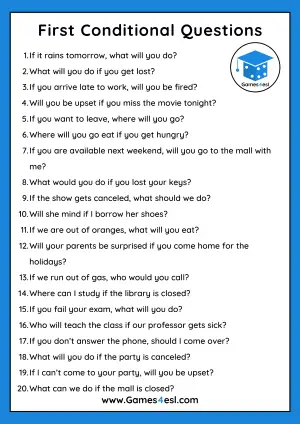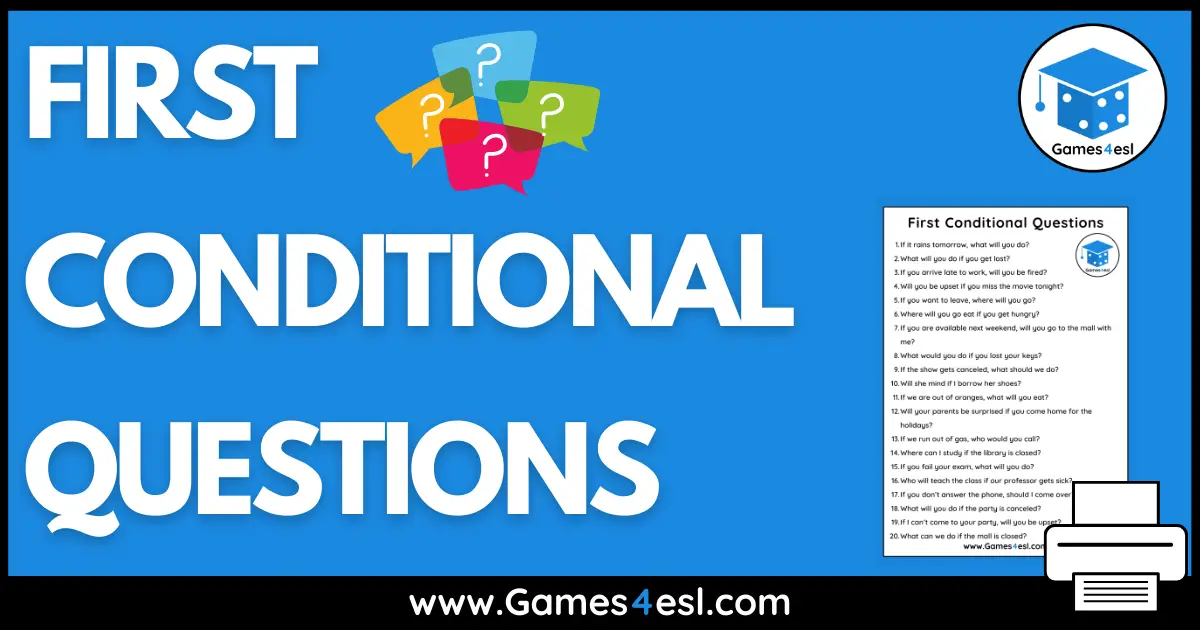First Conditional Questions
If I teach you how to use the first conditional, will you practice it today? First conditional questions like this are used very often by native English speakers and so it is important for English language learners to learn how to ask and answer first conditional questions. Below you’ll find many examples of first conditional questions you can use to practice speaking using the first conditional in English.
Related: How To Teach The First Conditional – Step By Step
First Conditional Questions
Here are many examples of first conditional questions.
- If it rains tomorrow, what will you do?
- What will you do if you get lost?
- If you arrive late to work, will you be fired?
- Will you be upset if you miss the movie tonight?
- If you want to leave, where will you go?
- Where will you go eat if you get hungry?
- If you are available next weekend, will you go to the mall with me?
- What would you do if you lost your keys?
- If the show gets canceled, what should we do?
- Will she mind if I borrow her shoes?
- If we are out of oranges, what will you eat?
- Will your parents be surprised if you come home for the holidays?
- If we run out of gas, who would you call?
- Where can I study if the library is closed?
- If you fail your exam, what will you do?
- Who will teach the class if our professor gets sick?
- If you don’t answer the phone, should I come over?
- What will you do if the party is canceled?
- If I can’t come to your party, will you be upset?
- What can we do if the mall is closed?

First Conditional Questions PDF
How To Make First Conditional Sentences And Questions
There are two structures for creating first conditional sentences and questions. These are:
- If + Condition, + Result.
- Result + If + Condition.
The condition is stated in the present simple tense and expresses something that may or may not happen. For example, “If class is canceled…”. The result is stated as will/won’t + base verb and expresses what will definitely happen if the condition is met. For example, “I’ll go to the mall.”
Sentence Structure 1: If + Condition + Result
“If class is canceled, I’ll go to the mall.”
Sentence Structure 2: Result + If + Condition
“I’ll go to the mall if class is canceled.”
Question Structure 1: If + Condition + Result
“If class is canceled, what will you do?”
Question Structure 2: Result + If + Condition
“What will you do if class is canceled?”
In these examples, notice how the future possibility is based on a specific condition. If that condition is met, then the result will happen. So, we don’t know whether or not class will be canceled, but if it is canceled, we will go to the mall.
When making first conditional sentences and questions, the word “will” can be substituted for other modal verbs or imperatives. Modal verbs are words like can, could, may, might, shall, should, would, and must. Imperatives are statements that make a command. For example,
- “If class is canceled, I can go to the mall.”
- “If class is canceled, we should go to the mall.”
- “If class is canceled, go home.”
- “If class is canceled, meet me at the mall.”
Thanks for reading. I hope you found these first conditional questions and examples useful. Before you go, be sure to check out the related resources below.

